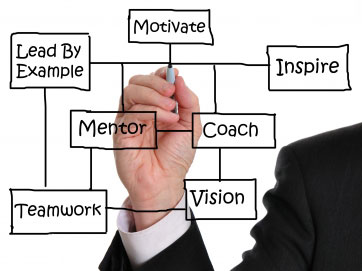Keith Nelson, course director of the Certificate of Higher Education in Coaching at the University of Cambridge explores key qualities required by the developing coach – and how these can be acquired.
A transformational coach is someone who has the capability to work in a way that enables transformational, positive change to take place within the client. Such change is achieved within the context of the coach creating a 'safe environment' for the client.
But what are the coaching qualities required to achieve this? Having trained many coaches over the years, I believe this can be achieved through a fusion of many ingredients, which can be broadly described in three main areas:
1) Coaching skills: Acquisition and internalisation of a broad range of coaching skills: (questioning, listening, rapport, empathy, feedback, goal-setting etc, etc.) |
2) Coaching knowledge: A knowledge of coaching concepts and developments, through keeping abreast of coaching literature. |
3) Coaching with head and heart: The ability to work comfortably within the psychological and emotional realms of coaching. |
Coaching skills
They provide the basis for all coaching. If these are not in place, then the coaching will always be limited. Refining these skills is a neverending journey.
Developing coaches can grow these through practice, practice and more practice.
Coaching knowledge
This describes the ability to keep up to date with coaching approaches. It is the ability to read and reference accurately key coaching concepts. It provides solid foundations for further coaching development. Acquiring and evidencing this knowledge will be a requirement for those coaches who embark upon accredited coach training programmes.
Developing coaches can enhance this through reading and understanding different coaching concepts and approaches.
Coaching with head and heart
This is the ability to coach with emotional intelligence – the ability to work with others' thoughts and emotions, while at the same time developing awareness and understanding of one's own thoughts and emotions. This is perhaps coaching's critical X factor. It is probably the most challenging aspect of coaching to internalise and is something we focus on at the University of Cambridge.
Developing coaches can grow this through raising self-awareness and finding those coach training programmes that will encourage them to develop this capability.
As a trainer of coaches, successfully developing capability in the psychological and emotional dimensions is crucial. From my experience as a coach trainer, developing this within the trainee coach requires the following:
- It requires the developing coach to become comfortable with self-disclosure. This often involves taking a risk. Typically, when facilitating a programme I will provide a coaching demonstration session, whereby I coach a delegate in front of the group. This can require a degree of courage from the developing coach – such coaching can become powerful, personal and profound and takes place in front of the group. Taking the risk in this way is a powerful step towards self-awareness. It is those students who put themselves forward in this way (and in also in general discussions throughout programmes) who then seem to develop more swiftly and effectively their internal capacity to coach transformationally. This is a very important lesson in coaching development. The developing coach is putting herself in the role of the client. After all, the developing coach, when working with clients, will need to be able to work comfortably with the psychological and emotional dimensions encountered when the client 'opens' up.
When conducting demonstration sessions and discussions, it is my role as the facilitator to ensure the environment is safe for all trainee coaches in the group.
- Secondly, it requires the trainee coach who is looking for a coach training provider to choose one that will encourage the development of the three key qualities described above, especially the provider's capability to encourage the development of coaching that works effectively with thoughts and feelings.
But what can the trainee coach do to identify the optimum provider, particularly when faced with a plethora of companies all seemingly offering the road to coaching heaven? Here are four things that can be done:
- Choose an accredited provider and confirm that the qualification (usually a certificate or diploma) is accredited by a nationally / internationally recognised institution
- Talk to the prospective providers. How much opportunity will there be on the programme for observed coaching practice – when you have the opportunity to coach another person and be observed doing so? How long are these sessions? How many are there in the programme? While observation by another delegate is good, will there also be direct observation from the facilitator or an experienced coach?
- Discuss the assessment criteria. Look for a provider whose assessment includes both knowledge and practical aspects of coaching
- Discuss the opportunities to explore the psychological and emotional dimensions. Is this encouraged within the programme? How is it done? How can this be achieved safely?
As a coach trainer, I am always keen to encourage delegates to become transformational coaches. I want delegates on the course I teach to be able to develop the capability and capacity to provide powerful coaching interventions with their clients. As stated earlier, this is probably the biggest challenge facing developing coaches – but it is also the one with the greatest coaching rewards.
Keith Nelson is course director of the Certificate of Higher Education in Coaching delivered at the University of Cambridge Institute of Continuing Education, he is the author of Your Total Coach: 50 Ideas for Inspiring Personal and Professional Growth and managing director of Your Total Coach










